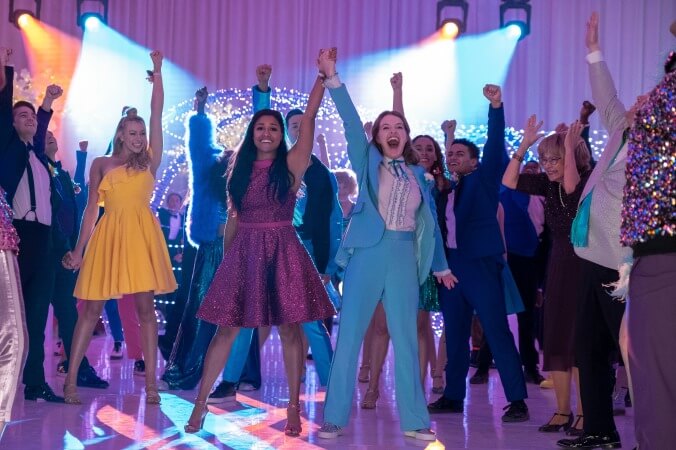Hollywood and Broadway have spent decades locked in a vicious cycle: Blockbusters from both have spent more money on lavish spectacle, which has in turn required enormous ticket sales to justify the investment, leading to bigger budgets to attract a larger audience, and on and on it goes. Yet that common ground doesn’t seem to have made adapting big shows into movies any easier. For every long-running production that becomes an Oscar-nominated hit like Les Miserables, there’s at least one Cats. (And plenty of people still make fun of Les Miserables anyway.) Better, perhaps, to adapt a more modest show like The Prom, which ran on Broadway for about a year, and focuses on smaller-scale fireworks generated when a conservative Indiana town resists a young woman’s attempt to bring a same-sex date to senior prom. There’s no reason a little high school dance can’t serve as a story’s dramatic fulcrum. Just ask any teen movie.
After a brief introduction to Emma, sympathetic principal Tom Hawkins (Keegan-Michael Key), and Alyssa’s forbidding PTA-president mom (Kerry Washington), the movie cuts to Dee Dee Allen (Meryl Streep) and Barry Glickman (James Corden), reeling from a recent musical flop. As they commiserate with aging chorus girl Angie Dickinson (Nicole Kidman) and Juilliard-grad-turned-sitcom-star-turned-bartender Trent Oliver (Andrew Rannells), they learn about Emma’s case and hatch a scheme: They’ll descend upon her Indiana town unsolicited, fight for her rights, defeat small-town bigotry, and gin up some great PR in the process.
The idea here is to spoof condescending, out-of-touch celebrity activism, conveyed through characters over-exclaiming would-be zingers like “We’re gonna help that little lesbian whether she likes it or not!” At least, that’s the idea for a little while. The Prom takes all of about 15 minutes before it flips its characters’ actorly vanity to cuddly relatability: Why, it turns out that Dee Dee and Barry both come from small towns themselves, and Barry nurses old wounds from his own difficulties growing up gay in Ohio (portrayed in the softest, least upsetting terms possible). Not long after these revelations, poor Keegan-Michael Key (whose principal happens to be a massive fan of Streep’s Dee Dee) must warble a paean to the genuine, life-changing magic of theater. Naturally, he picked up this appreciation for the medium not by attending any lowly local production but by traveling to see shows on Broadway, in a sequence that could have been produced by a New York City tourism board—and, come to think of it, vaguely resembles the vacation-based enlightenment of Ryan Murphy’s previous film, Eat Pray Love.
Yes, it’s been a decade since Murphy directed a feature. He’s been so prolific as a TV creator that it’s easy to forget his previous career teasing out the toxic self-regard from various bestsellers. Ten years later, Murphy has yet to find an inexplicable camera angle he won’t use for a second or two, and The Prom’s editing sometimes makes it actively difficult to discern simple scene-setting information like the time of day. At one point, the movie cuts between Dee Dee on a dinner date and kids engaging in prom-posals, implying that the two events are either closely related (they’re not) or happening simultaneously (also no). If nothing else, Murphy’s first movie musical doesn’t bolt down the camera like so many theatrically inspired productions. To the contrary, he’s learned from his post-Glee television work that the camera should be moving as often as possible, in any direction, even or especially if it conveys no meaning. The musical numbers have welcome stylizations—like a heavy use of blue, pink, and purple lighting—without ever actually becoming stylish. Design elements float around in search of great tunes or inspired choreography, both in short supply.
The pacing is straight Broadway: a whirlwind “first act” of introductions and adrenalized premise restating, followed by a poky second half that endeavors to give each actor a showstopping turn in the spotlight. The only one that comes close to connecting is Rannells, who holds court in the local mall with a song that’s like an amusing reversal of The Music Man, trying to convince teens to chill out rather than riling up paranoid adults. Kidman has less luck with a Fosse parody where she extols the virtues of “zazz,” while Corden finds a new way to confirm his status as film’s preeminent professional nuisance in a subplot that’s all about forcing a mawkish emotional breakthrough. (It air-drops in a famous face, albeit half-concealed with old-age makeup, to do so.)
Where’s Emma in all of this? Well, she grows close to Kidman’s semi-alcoholic background player—or so the movie explains without actually dramatizing this process. For an earnest tribute to the life-changing power of acceptance, The Prom doesn’t seem especially interested in accepting Emma as an individual person. Instead, likable newcomer Pellman spends a lot of screen time grinning in delighted disbelief at her costars; Emma’s relationship to their motivating opportunism is passive and incidental, just like everything else about her. Who she is, what she likes, and what connects her to the equally underserved Alyssa are less important than assuring the audience that minds will get changed, hearts will get melted, and heartfelt confessional songs posted online will go viral in an instant. On stage, the contrivances might seem less glaring (although the songs truly are terrible). As a movie, The Prom is all-star, feel-good, zazzy nonsense. Long after Murphy’s film drops its cutesy cynicism, it still manages to accidentally produce a damning indictment of Broadway phoniness.

